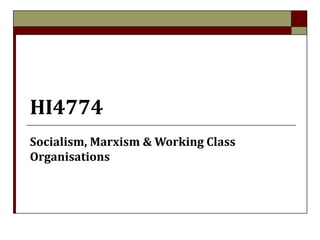
17. socialism
- 1. HI4774 Socialism, Marxism & Working Class Organisations
- 2. Jim Connell, ‘The Red Flag’ (1889) The people’s flag is deepest red, It shrouded oft our martyred dead, And ere their limbs grew stiff and cold, Their hearts’ blood dyed its every fold. Then raise the scarlet standard high. Within its shade we live and die, Though cowards flinch and traitors sneer, We'll keep the red flag flying here.
- 3. Industrialisation: Some Problems & Responses Consequences of Industrialisation => Problems Poor living and working conditions Fear of radicalism, disease, immorality … State Intervention from the 1830s and 1840s – especially in Britain and France Poor Law Amendment Act (1834) Development of “Working Class Consciousness” The Luddites (1811-12) Workers Associations, Trade Unions, Co- operatives
- 4. “Utopian” Socialism: Some Examples Charles Fourier - Phalanxes - The Theory of Social Organisation (1820) Robert Owen - New Lanark - Villages of Co- operation Henri de Saint-Simon & the Saint Simonians
- 5. Karl Marx and ‘Scientific’ Socialism b. Trier, 1818; d. London, 1883 The Communist Manifesto (1848) Capital (Das Kapital), volume 1 (1867) Important as a savage critique of Capitalism and pointed towards a revolutionary alternative: Communism
- 6. Karl Marx & Class Struggle The economic development of society creates class struggle. ‘The history of all hitherto existing society is the history of class struggles. Freeman and slave, patrician and plebeian, lord and serf, guild-master and journeyman, in a word, oppressor and oppressed, stood in constant opposition to one another, carried on an uninterrupted, now hidden, now open fight, a fight that each time ended, either in a revolutionary reconstitution of society at large, or in the common ruin of the contending classes.’ (Marx, The Communist Manifesto)
- 7. Karl Marx & Revolution By the nineteenth century, in Capitalist societies, class struggle involved the Bourgeoisie and the Proletariat. The growing size, oppression and misery of the Proletariat under capitalism would inevitably produce revolution. Revolution would result in the ‘Dictatorship of the Proletariat’, which would give way to a classless society.
- 8. Varieties of Socialism in the later Nineteenth Century Reform Socialists work within the existing political system Revolutionary Socialists - Marxists overthrow the existing system, create a new one based on the ‘proletariat’ Anarchists destroy the state completely Syndicalists opposition to the state via trade unions and strike action
- 9. Organising Socialism The International Workingmen’s Association (‘First International’) - 1864 Opposition forum Dissemination of Marxism The Second International -1889 Less eclectic > Marxism dominated Based on Socialist parties from different nation-states Problems Reform or Revolution? Should socialists collaborate with middle-class radicals? Internationalism & Nationalism?
- 10. Socialism in Nation States: Two examples Germany Social Democratic Party (SPD) 1875; win 20% of the vote at the 1890 election Eduard Bernstein initiates the ‘revisionist’ debate, 1896-1898. Great Britain ‘New’ Unionism, 1880s: emergence of more broadly based, militant and socialist trade unions Fabian Society (1884). Labour Representative Committee (1900); the ‘Labour Party’ (1906).